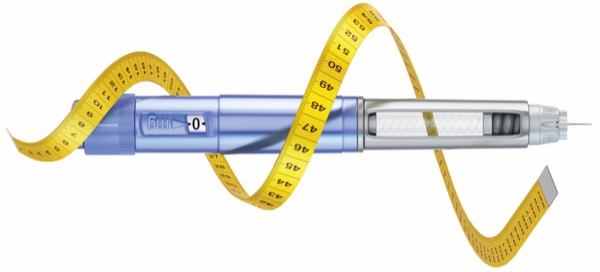SAN FRANCISCO—Obesity, especially when manifested by visceral adipose tissue, seems to be associated with worse inflammatory bowel disease outcomes, but new obesity treatments appear safe and effective in this setting, according to a presentation at the 2025 Crohn’s & Colitis Congress.
“There is emergent data to suggest that [glucagon-like peptide-1 receptor agonists (GLP-1s)] have similar efficacy and are likely reasonably well tolerated in patients with IBD, and they may have an anti-inflammatory impact,” though more data are needed, said speaker Amanda Johnson, MD, a gastroenterologist at Mayo Clinic in Rochester, Minn.
Multiple studies suggest that between 15% and 40% of IBD patients are obese, and the frequency of this combination is rising, Dr. Johnson said. “That then begs the question: How might obesity be associated with or actually perpetuate some of the inflammatory burden in patients with IBD?” she said, noting there is evidence that visceral adipose tissue (VAT) is a source of pro-inflammatory cytokines and that higher visceral adiposity is associated with more negative prognoses in IBD, such as a reduced likelihood of responding to biologic therapies and higher risk for surgery.
Dr. Johnson described a prospective study that found higher trough levels of infliximab were needed for patients in the highest two quartiles of VAT to achieve clinical and endoscopic remission (Am J Gastroenterol 2023;118[11]:2005-2013). Those with lower VAT attained remission at lower trough levels (3.9 mcg/mL for steroid-free remission and 4.9 mcg/mL for endoscopic remission) than in the highest two quartiles (15.3 and 13.6 mcg/mL, respectively).
A prospective observational study of infliximab, vedolizumab and ustekinumab also found worse outcomes with higher intraabdominal VAT levels but no correlation between intraabdominal VAT and drug levels (Gastroenterology 2023;165[4]:963-975.e5). “The drug levels may play a role, but there’s probably something intrinsic to obesity that also impacts this,” Dr. Johnson explained.
The next question, she said, is whether weight loss improves therapeutic outcomes. This hasn’t been well studied, although obesity is known to affect IBD therapeutic outcomes, quality of life and healthcare utilization, she added.
{RELATED-VERTICAL}Dr. Johnson discussed potential therapies for weight loss in IBD patients. Diet and lifestyle changes are still a mainstay for weight loss, she said, but efficacy is modest because of weight regain. She recommended the Mediterranean diet because it may have anti-inflammatory effects and has demonstrated benefit in many chronic conditions often associated with obesity.
GLP-1s for weight loss are important to consider carefully, given concerns about their potential gastrointestinal side effects, she said. However, these agents appear to have efficacy in IBD patients that is similar to that in the general population, with no obvious difference in side effects. “The data that we have suggest probably similar rates of GI side effects in patients with IBD as compared to the general population. It’s important to keep in mind [that] these [side effects] tend to be dose-dependent, usually mild to moderate, and they occur most commonly during the initiation or up-titration phases,” she said.
She recommended slow dose escalation if patients are experiencing symptoms in the first few weeks of therapy. Patient education upfront can be helpful, to help “manage expectations,” according to Dr. Johnson. She also suggested dietary modifications, including smaller, more frequent meals, staying upright after meals, and eating more slowly, can help patients experiencing symptoms.
In addition, she said that there may be a role for the combination GLP-1/glucose-dependent insulinotropic polypeptide agonist tirzepatide (Zepbound, Lilly).
Another question is whether weight loss reduces inflammation and improves IBD symptoms, she said, noting that some studies show improved IBD outcomes with GLP-1 use. “I think the message is that we’re not seeing any strong signals that suggest that [treatment with GLP-1s] makes things worse. Obesity, particularly increased visceral adiposity, appears to negatively impact IBD outcomes,” she added.
Dr. Johnson offered some strategies for IBD therapeutic management in patients with obesity, including weight-based regimens of biologics when possible, small-molecule drugs that are less likely to be affected by pharmacokinetics in obesity and proactive therapeutic drug monitoring.
During a question-and-answer period after the talk, Hilary Michel, MD, a pediatric gastroenterologist at Nationwide Children’s Hospital, in Columbus, Ohio, noted that she and her colleagues frequently see malnourished children who improve after treatment with tumor necrosis factor (TNF) inhibitors. “Their weight catches up, and then there’s a subset where it just keeps going, and it seems out of proportion to just their disease healing and them getting better and being able to absorb the nutrients,” she said. “Do you see this in adults as well, and do you have thoughts about why this happening?”
Dr. Johnson replied that it is common for patients to ask to be taken off TNF inhibitors due to a suspicion that it is causing unwanted weight gain, although she has “a little bit of hesitation in doing that.”
Moderator David Bruining, MD, a gastroenterologist at Mayo Clinic, asked whether physicians should view obesity differently in the context of Crohn’s disease than in ulcerative colitis, “or is it good enough right now to think of it globally as obesity affecting IBD?” Dr. Johnson replied that “there’s certainly data both in [ulcerative colitis] as well as Crohn’s disease that obesity has that negative impact. I don’t know that I would necessarily think about one being impacted [more than] the other.”
—Jim Kling
Drs. Bruning and Michel reported no relevant financial disclosures. Dr. Johnson reported financial relationships with AbbVie and BMS.

